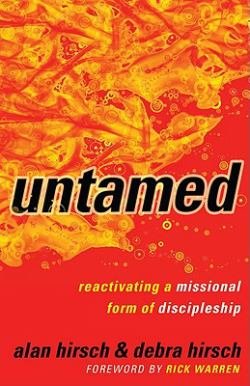I’ m getting rocked on discipleship these days. From my positive experiences in the pub, in the projects or in God’s presence to a deepening desire for more disciples, more discipleship, more life sharing on mission. God is using the Hirsch’s book to call me into deeper missional discipleship—making disciples while on mission.
m getting rocked on discipleship these days. From my positive experiences in the pub, in the projects or in God’s presence to a deepening desire for more disciples, more discipleship, more life sharing on mission. God is using the Hirsch’s book to call me into deeper missional discipleship—making disciples while on mission.
As I share in Fight Clubs: gospel-centered discipleship, for years I approached discipleship as a program, as a meeting, and as a professional/novice relationship. Progress has been made. I moved from the top of the stairs to floor of the living room, where I can sit in the circle of my City Group, staff, or neighborhood friends. I am grateful that I have been inconvenienced by actually sharing my life instead of simply sharing my insight.
I’m also on mission. I’m trying, very imperfectly, to share my life, my struggles, my hopes, and my dreams with those around me. I’m also trying to listen to others struggles, hopes, and dreams so we can all make progress together, some of in the faith, others toward the faith. Dinner with the neighbors. Outings with the City Group. Breakfast with leaders. Evenings in the projects and pubs. A lot has changed in my life, but not enough.
If missional defines our being sent out into the world, then incarnational must define the way in which we engage the world.
The Hirsch’s put a point on mission when the say: “If missional defines our being sent out into the world, then incarnational must define the way in which we engage the world” (Untamed, 234). The proof of our mission is our incarnation of Jesus into un-Christian communities and lives. It doesn’t matter how much you know about culture, missiology, or urbanism if you aren’t actually engaging real people in context (I want names!).
So many church planters ask me what to do in the “Core Team Phase”. They ask: “How do I build my core?” I ask them: “Do you know your neighbors? Have you had them all for dinner or a party?” Inevitably the answer is “No” or “Wow.” Church planters, disciples of Jesus, if we aren’t circumscribed into others’ lives, we are not on mission. Stop waving the flag and join the race. Jump in with people now. This was Jesus’ whole agenda. Let’s make it our agenda–incarnating the hope of the gospel in relationship.


 Godly Leadership among the people of God is critical. If a man cannot lead himself or his family well, how is he to lead others well? Unfortunately, disciplining yourself for godliness isn’t popular (1 Tim 4:7). Many opt out. Some to their own eternal loss (Heb 12:14). But fortunately, godliness is actually real gain (1 Tim 4:8; 6:6). To live a godly life is to enter into God’s blessing, and that blessing has a way of cascading into others’ lives. Here are some resources to help you cultivate the blessing of a godly life:
Godly Leadership among the people of God is critical. If a man cannot lead himself or his family well, how is he to lead others well? Unfortunately, disciplining yourself for godliness isn’t popular (1 Tim 4:7). Many opt out. Some to their own eternal loss (Heb 12:14). But fortunately, godliness is actually real gain (1 Tim 4:8; 6:6). To live a godly life is to enter into God’s blessing, and that blessing has a way of cascading into others’ lives. Here are some resources to help you cultivate the blessing of a godly life: